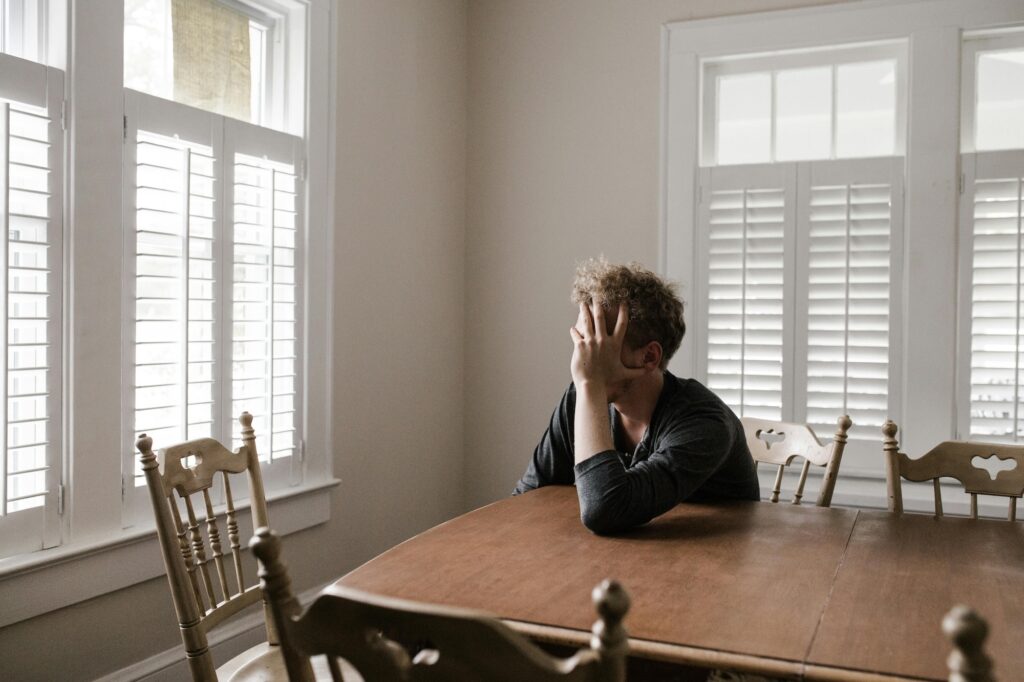Ghosting Someone You Love
In modern dating, “ghosting” has become an all-too-familiar term. In fact, 30% of American adults say they have been ghosted at some point. More often than not, ghosting is associated with casual dating and short-term relationships. But another less-talked-about scenario is ghosting someone you love. You may be wondering why anyone would do this, and the answer is complicated. In this article, we explore the reasons behind ghosting someone you love and share tips on how to move forward.

In modern dating, “ghosting” has become an all-too-familiar term. In fact, 30% of American adults say they have been ghosted at some point. More often than not, ghosting is associated with casual dating and short-term relationships. But another less-talked-about scenario is ghosting someone you love. You may be wondering why anyone would do this, and the answer is complicated. In this article, we explore the reasons behind ghosting someone you love and share tips on how to move forward.
What is ghosting?
Ghosting is the act of suddenly and completely cutting off all communication with someone without any explanation or warning. It can happen in any type of relationship: romantic, platonic, or professional. This behavior often leaves the person being ghosted confused and hurt, wondering what they did wrong and why the other person suddenly disappeared.
It can be emotionally damaging and can have long-lasting effects on a person’s self-esteem. It can also impact their ability to trust in future relationships. While ghosting isn’t a new phenomenon, it has become more prevalent with the rise of technology and online dating.
Why does ghosting someone you love happen?
Ghosting someone you love isn’t a simple action. It often involves a blend of strong and sometimes conflicting emotions. When you care deeply for someone, the thought of hurting them can be paralyzing. So why does ghosting someone you love happen?
One of the most common reasons people ghost a loved one is a deep-seated fear of intimacy. Intimacy requires vulnerability, the willingness to open up and share your deepest thoughts, fears, and desires. For some, this level of openness is terrifying. This fear often stems from past experiences and attachment styles formed in childhood.
People with avoidant attachment styles, for example, can struggle with closeness, viewing it as a threat to their independence and fearing that it will inevitably lead to rejection and pain. Ghosting becomes a way to escape the potential risk of being hurt or overwhelmed by emotional closeness.
Fear plays a significant role in ghosting. Whether it’s the fear of confrontation, rejection, or vulnerability, these anxieties can cause someone to retreat rather than communicate openly. This fear is amplified when strong emotions are involved, as the potential for pain on both sides becomes much greater.
A lot of this happens subconsciously. The person ghosting may not even be aware of their avoidant tendencies or past traumas that influence their behavior. They may just feel overwhelmed or stifled. These feelings can lead them to emotionally shut down and retreat, resulting in ghosting.

It can be a form of self-sabotage and a way to avoid further emotional turmoil. Self-sabotage is a behavior that is often rooted in deep-seated beliefs of unworthiness. People who subconsciously believe they don’t deserve happiness or love might engage in actions that damage or destroy their relationships. The thought of getting closer to someone they love may trigger an underlying sense of fear, leading them to push the person they love away. They may tell themselves that the person they love is better off with someone else.
Ghosting someone you love occurs when the fear of getting hurt outweighs the fear of losing that person. It’s possible to love someone deeply yet greatly fear the potential pain their love could bring. Particularly if this comes with the sense of unworthiness we just discussed, someone might fear that once their loved one gets to know them on a deeper level, they will eventually leave. In their minds, it can be better to disappear before that happens.
The internal conflict experienced when ghosting someone you love can cause significant sadness and distress. This turmoil is often a struggle between wanting to preserve one’s own sanity and not wanting to inflict pain on the person they love. Inner conflict can also result from a lack of clarity about one’s own emotions and why one feels the way they do.
How is the person who was ghosted impacted?
The person who is ghosted experiences a whirlwind of emotions. Understanding the impact on them is crucial for comprehending the full scope of ghosting someone you love.
Being ghosted by someone you love can lead to profound emotional devastation. The abrupt end without closure can leave the ghosted person grappling with feelings of rejection, confusion, and worthlessness. This isn’t usually the intention of the person who ghosted them, but it’s often the result.
The ghosted individual can also struggle with trust and vulnerability in future relationships. The sudden disappearance of someone they loved and trusted can make it challenging to open up to another person for fear of being hurt again.
In addition, the lack of closure often prompts the ghosted person to search for answers. The quest for understanding can consume their thoughts, impacting their mental health and overall well-being. They may constantly replay scenarios in their head, trying to pinpoint where things went wrong or what they could have done differently. This can hinder their ability to move on and heal.
As you can see, ghosting someone you love can have a significant impact on both parties involved. It has long-lasting and complex ramifications that go beyond just the immediate relationship.
What should you do if you’ve ghosted someone you love?
If you’re reading this article, there’s a high chance that you’ve ghosted someone you love. If so, you have probably been struggling with feelings of guilt, shame, confusion, sadness, and regret. It’s a lot to process, and it’s not an easy situation to navigate. But there are steps you can take to move forward and make amends.
It takes courage to recognize that you’ve hurt someone, especially someone you care about. The first step is to take responsibility for your behavior and acknowledge that ghosting wasn’t the right way to handle the situation. Take a step back, think about your actions, and try to understand the impact they’ve had. You may need the help of a therapist or counselor to gain clarity and work through any underlying fears and attachment issues that led you to ghost in the first place.
The next step is to decide whether to reach out to the person you ghosted or not. Most people appreciate an explanation and apology, but it isn’t necessarily the right step. One of the main benefits of apologizing is providing the other person with closure. Ghosting leaves many questions unanswered, and an apology can help address some of these uncertainties.
Apologizing also acknowledges the pain and confusion caused by ghosting. It validates the ghosted person’s feelings by conveying that their emotional experience matters. This acknowledgment can be an important step in their healing process. By apologizing, you can also restore some respect to the relationship itself. It shows that you value the other person enough to confront your mistakes and seek to make amends.

For the ghoster, apologizing can also be a step towards self-healing too. Carrying the weight of guilt and regret can be burdensome. Apologizing can provide a sense of relief and closure, helping you to process and move past your actions.
However, an apology isn’t always the best course of action. It can sometimes reopen emotional wounds, especially if the ghosted person has already started to heal and move on. Hearing from the ghoster might stir up old feelings and set back their progress. If they’ve clearly stated that they don’t want further contact, it’s important to respect their wishes and focus on your own healing.
So deciding whether to apologize or not is dependent on the situation and the individuals involved. If you do decide to reach out, make sure to approach the conversation with empathy and understanding. Take responsibility for your actions, apologize sincerely, and validate their feelings. It’s important to remember that an apology doesn’t automatically fix everything or guarantee forgiveness.
An example apology is: “I wanted to let you know I’m very sorry for my actions and the hurt I caused by ghosting you. I can see now that it wasn’t the right way to handle things, and I deeply regret causing you pain.”
What about getting back together?
If you’ve ghosted someone you love and are thinking about the possibility of getting back with them, it’s important to approach the situation thoughtfully. Reconciliation can be a viable option if both parties are willing to communicate openly and work hard on rebuilding trust.
First and foremost, it’s essential to address the reasons why you ghosted in the first place. Was it due to fear, insecurity, or unresolved issues within yourself? Without understanding and addressing these underlying factors, getting back together may just lead to a repeat of old patterns, which can be deeply distressing for both parties involved and cause even more pain.
If you do want to pursue a potential reconciliation, it’s important to communicate what you’ve been doing to address your own issues and work on improving yourself. For example, if you’ve been learning how to communicate better or working on your commitment issues, sharing that with the other person can show them your willingness to change and grow. This helps to show that you are truly committed to making the relationship work and that you know things will have to be different this time around.
Sometimes, people are open to trying again after ghosting, and other times they are not. Ghosting is one of the most damaging things you can do in terms of breaking trust in a relationship, and it’s understandable if the other person doesn’t want to give it another chance. If so, it’s important to accept their decision and focus on your own journey.
If you genuinely love and care for the other person, you will respect their wishes and give them the space they need to heal. Use the experience as an opportunity for personal growth. Understand the emotional complexities that led to your actions and work on developing healthier behavioral patterns and communication skills for future relationships.
If the person you ghosted is open to getting back together, approach the relationship with patience and understanding. Rebuilding trust takes time—potentially a lot of time, depending on the situation. So you both need to be fully committed to that journey. Be prepared to take it slow and remember to keep the lines of communication open. The person you ghosted will likely be particularly sensitive to any signs of rejection or a lack of communication, so make sure to be reassuring and consistent in your actions.
Final thoughts on ghosting someone you love
Ghosting someone you love is a seemingly counterintuitive act that stems from difficult emotions and deep-seated issues. It may appear to be the easiest way out, but in reality, it causes a lot of pain and has far-reaching consequences. If you can avoid ghosting someone you love, that’s always the best option by far. But if you’re here now, we appreciate that it may be too late for that, and you may be in a situation where you have to deal with the aftermath.
Understanding the psychology behind ghosting someone you love and addressing the emotional complexities involved is crucial for anyone navigating this complicated and emotionally charged terrain. It’s undoubtedly a deeply painful experience for all involved, but it can be a catalyst for personal growth and self-awareness. It’s never too late to learn from past mistakes, take accountability, and work towards becoming a better version of yourself.




